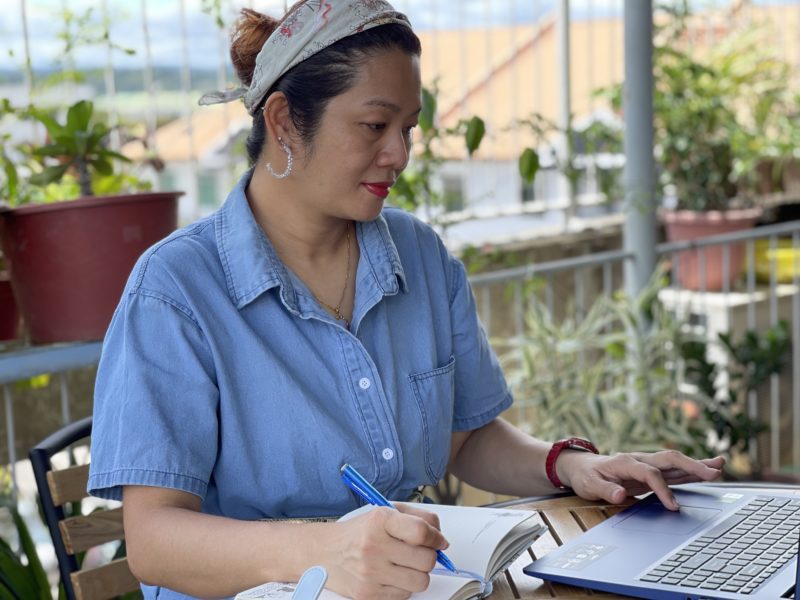Project Insights Report
Building Capacity and Skills to Survive Shock for Current and Future Not-for-Profit Managers: A New Approach
 Executive Summary
Executive Summary
The project “Building Capacity and Skills to Survive Shock for Current and Future Not-for-Profit Managers: A New Approach,” led by McMaster University, established a new experiential, open-source learning curriculum involving nonprofit managers and undergraduate university students. The project involved a partnership with United Way Halton & Hamilton and The/La Collaborative. Its aim was to bolster social innovation in Canada’s not-for-profit sector to enable program delivery and to support organizational resilience. University students would, as fellow learners, benefit from the practical experience and mentorship of nonprofit managers.
Following a co-design process to develop the curriculum, an Innovation for Social Impact course was piloted at McMaster University and later delivered at the University of Ottawa and the University of Guelph. In total, 62 undergraduate students and 12 nonprofits participated. The course was well-received by nonprofit managers, who appreciated their dual roles as learners and mentors. The approach to community engagement, co-design and delivery were all well-received, and stakeholders provided specific recommendations to improve future course delivery. However, the evaluation was not able to systematically assess how social innovation was being adopted into organizations, or the impact on organizational resilience.
One major positive outcome was the development of partnerships, which led to the formation of the Canadian Forum for Social Innovation.
Key Insights
An experiential course on social innovation in the not-for-profit sector was successfully co-designed and delivered at three universities, with 62 students and 12 nonprofits participating.
Nonprofit managers appreciated their dual roles as learners and mentors, as well as acquiring an understanding of frameworks for social innovation to implement in their work.
The partnerships developed through this project led to the creation of the Canadian Forum for Social Innovation.
 The Issue
The Issue
Social innovation is described as the process of creating and delivering new solutions to societal problems. The ability to innovate is essential for not-for-profit organizations to operate and implement their services effectively. The COVID-19 pandemic further reinforced the need for nonprofits to be innovative to build their own stability, resilience and growth in the face of external challenges or shocks. Nonprofit organizations are a vital component of Canada’s social safety net, so the closures of some organizations due to the pandemic impacted the communities they served. Strengthening social innovation capacity among nonprofits is one way to drive their success and resilience.
The traditional approach to capacity building among nonprofits often lacks a structured learning approach that integrates academic and practical perspectives. Academic environments provide a structured approach to learning, but typical classes do not usually offer opportunities for practical application of theoretical education.
An experience-based course on social innovation that combines theoretical knowledge with practical application could benefit both nonprofit organizations and academic institutions that teach social innovation. Nonprofit managers would gain from systematic upskilling in innovation to apply to their work. Undergraduate students would benefit from the real-life experiences and mentorship of those working in the sector.

 What We Investigated
What We Investigated
This project aimed to develop and test a new skills training model that bridged the academic and not-for-profit sectors. The experiential learning course called “Innovation for Social Impact” was developed and launched to achieve this goal. It aimed to enhance the skills and capabilities of nonprofit managers, initially from the United Way network, and undergraduate students in social sciences, business and humanities. McMaster University, United Way Halton & Hamilton and The/La Collaborative were partners on this project.
The curriculum, which was co-designed, was intended to serve as a resource for other schools interested in community-engaged education. Another objective was to create an online platform to support a nation-wide community interested in social innovation.
The primary questions were designed to assess the capacity of the Innovation for Social Impact concept to:
- generate genuine reciprocity among partners in an experiential co-learning context;
- build a foundational layer of skills for social innovation to increase the capacity of nonprofits to conduct social innovation;
- create a genuine experiential, applied learning experience for students;
- support community engagement and relationship-building.
Because the project created and operationalized a new model of engagement and course delivery, the following three activities underscored the project objectives: community relationship-building, course development and pedagogical research related to community-based experiential learning.
The project was delivered in two phases. The first phase was to develop and pilot the experiential learning course template at McMaster University based on the open-access set of curriculum protocols. In phase two, the project was scaled to the University of Ottawa and University of Guelph.
The project included co-design sessions, iterative prototyping of course materials, and the use of a digital commons platform to support ongoing participant engagement and capacity building.
After the McMaster pilot, interviews were conducted with two instructors, four nonprofits and two students. After the course was scaled, interviews were conducted with four instructors, three intermediaries (United Way) and seven nonprofits. Brief interviews were completed with two university administrators. Online student surveys were launched but did not yield enough responses to be included in the assessment.
 What We’re Learning
What We’re Learning
The course was developed and taught five times at three universities. Sixty-two undergraduate students and 12 nonprofits participated. The project experienced delays due to issues with technology partners, which affected the integration of its four main components: the Innovation for Social Impact package, Self-directed Skills Assessment and Literacy Tool, digital commons and brokering platform.
Nonprofit and university partnerships led to pan-Canadian initiatives
A key achievement for McMaster University was the successful co-design and prototyping of the course content with nonprofit managers. Another was the strong engagement with partners. These led to convening a pan-Canadian dialogue to create alignment on education, practice and policy around social innovation, and the launch of the Canadian Forum for Social Innovation. The lessons from an evaluation of the project centred mostly on the process of co-creating and delivering the course, with detailed recommendations on improvements.
Most objectives met, but limited understanding of longer-term impacts
The evaluation suggested that the Innovation for Social Impact concept achieved three of four objectives. The project generated genuine and positive exchange for partners and supported community engagement and relationship-building. Although student responses were limited, the feedback from nonprofits suggested that the course did create an experiential learning experience for students. Nonprofit managers valued their roles as co-learners and mentors to students, bringing real-world examples into their interactions. However, it was not determined whether the course increased the social innovation capacity of nonprofits as intended. The evaluation suggested some uptake, as a few respondents reported bringing learned concepts into staff discussions and grant applications. The evaluation was not able to assess longer-term outcomes related to improvements in social innovation or improved resilience in nonprofits. Due to low responses to the student survey, it was also not possible to determine whether or how the course influenced students’ transition to work.
Streamlining and practical application maximize impact for learners
Nonprofit leaders who participated indicated satisfaction and engagement. They appreciated social innovation learning frameworks that validated their existing work. One challenge was the significant time commitment, which totalled 36 hours of classes plus reading and commuting. One recommendation was to streamline the timing. Nonprofit managers also expressed a need for more practical guidance on applying what they learned in their organizations. Another recommendation was to provide a certificate to acknowledge participation and professional development.
The project supported infrastructure to deliver training
The instructors appreciated the course for boosting their confidence in delivering community-engaged experiential learning. However, they faced challenges, such as increased workloads, and identified the need for strong facilitation skills for this type of course. Community partners were ready to engage in further aspects of the research, which was an unexpected result that led to expanded partnerships and new collaborations with entities like Social Innovation Canada and the Maison de l’innovation sociale, a Quebec-based social innovation hub.
 Why It Matters
Why It Matters
The insights from this initiative are helpful for other academic and nonprofit partnerships that want to create community-engaged, experiential learning experiences.
The project’s co-design and stakeholder engagement approach provides a model for developing community-engaged educational programs across various sectors. By involving diverse stakeholders in the design process, programs were tailored to participants’ specific needs. In addition, the engagement of a broad range of stakeholders around the objectives of the project was well-received and led to the inauguration of the Canadian Forum for Social Innovation. The project’s role in fostering a network for social innovation underlines the potential of educational programs to drive broader networks and systemic change. By connecting participants with a larger community of practice, the program not only focused on individual learning outcomes but also contributed to innovation in the nonprofit sector more broadly.
Challenges with technology partnerships in the project shed light on the need for more sustainable funding and partnership models among universities and nonprofits. The reliance on in-kind contributions for technology posed significant hurdles, highlighting the need for reliable digital resource delivery in educational programs. This could prompt policies that support robust technology integration, particularly in initiatives with multiple stakeholders and digital components.

State of Skills:
Evaluation and Learning in the Skills and Training Ecosystem
The Future Skills Centre’s approach to evaluation and learning has evolved over time, reflecting the challenges of measuring social impact. It has shifted from a focus on common outcomes to a broader approach that embraces multiple methods for understanding impacts on individuals, institutions and systems.
 What’s Next
What’s Next
The course in social innovation is available at McMaster University. In addition, the Canadian Forum for Social Innovation has received funding from the Social Sciences and Humanities Research Council to further develop its research and guidance on social innovation in Canada.
FSC Insights
Have questions about our work? Do you need access to a report in English or French? Please contact communications@fsc-ccf.ca.
More from FSC
Calgary Regional WIL Secretariate and Portal
Strength in structure
Employment Impacts of Canada’s Emission Reduction Plan
How to Cite This Report
Boskov, S. (2025). Project Insights Report: Building Capacity and Skills to Survive Shock for Current and Future Not-for-Profit Managers: A New Approach, McMaster University. Toronto: Future Skills Centre. https://fsc-ccf.ca/projects/building-capacity-nonprofit/
Building Capacity and Skills to Survive Shock for Current and Future Not-for-Profit Managers: A New Approach is funded by the Government of Canada’s Future Skills Program. The opinions and interpretations in this publication are those of the author and do not necessarily reflect those of the Government of Canada.




